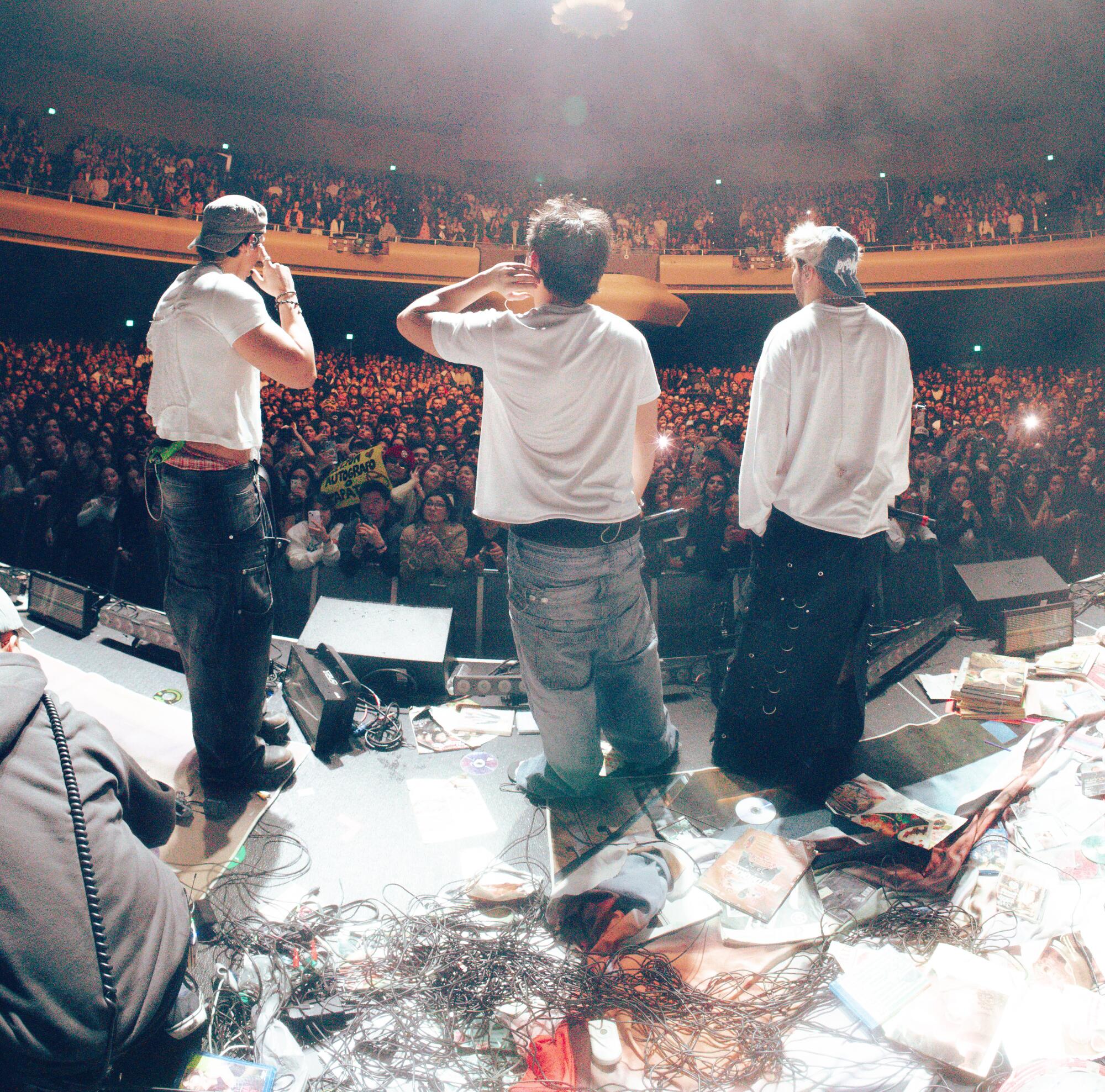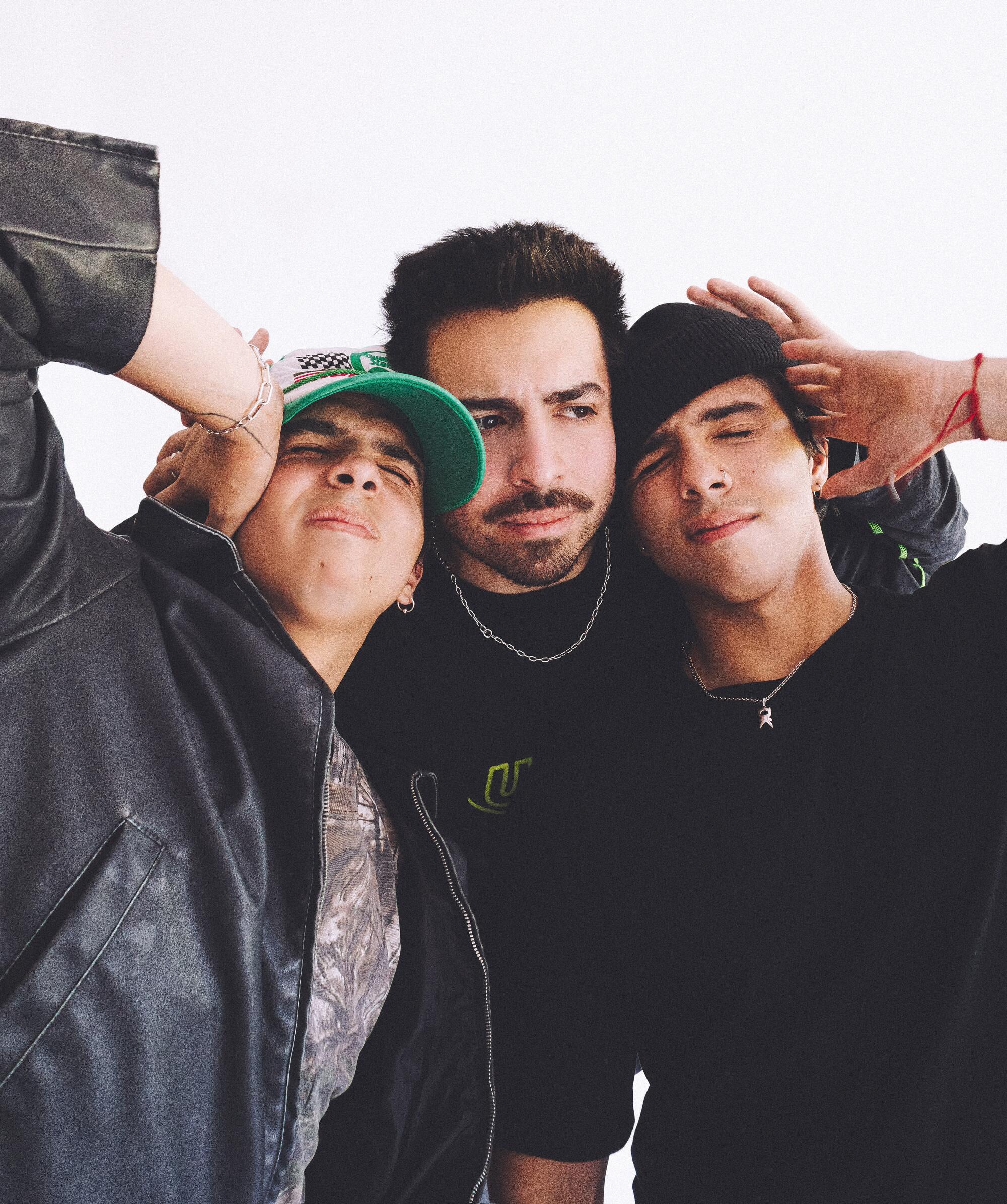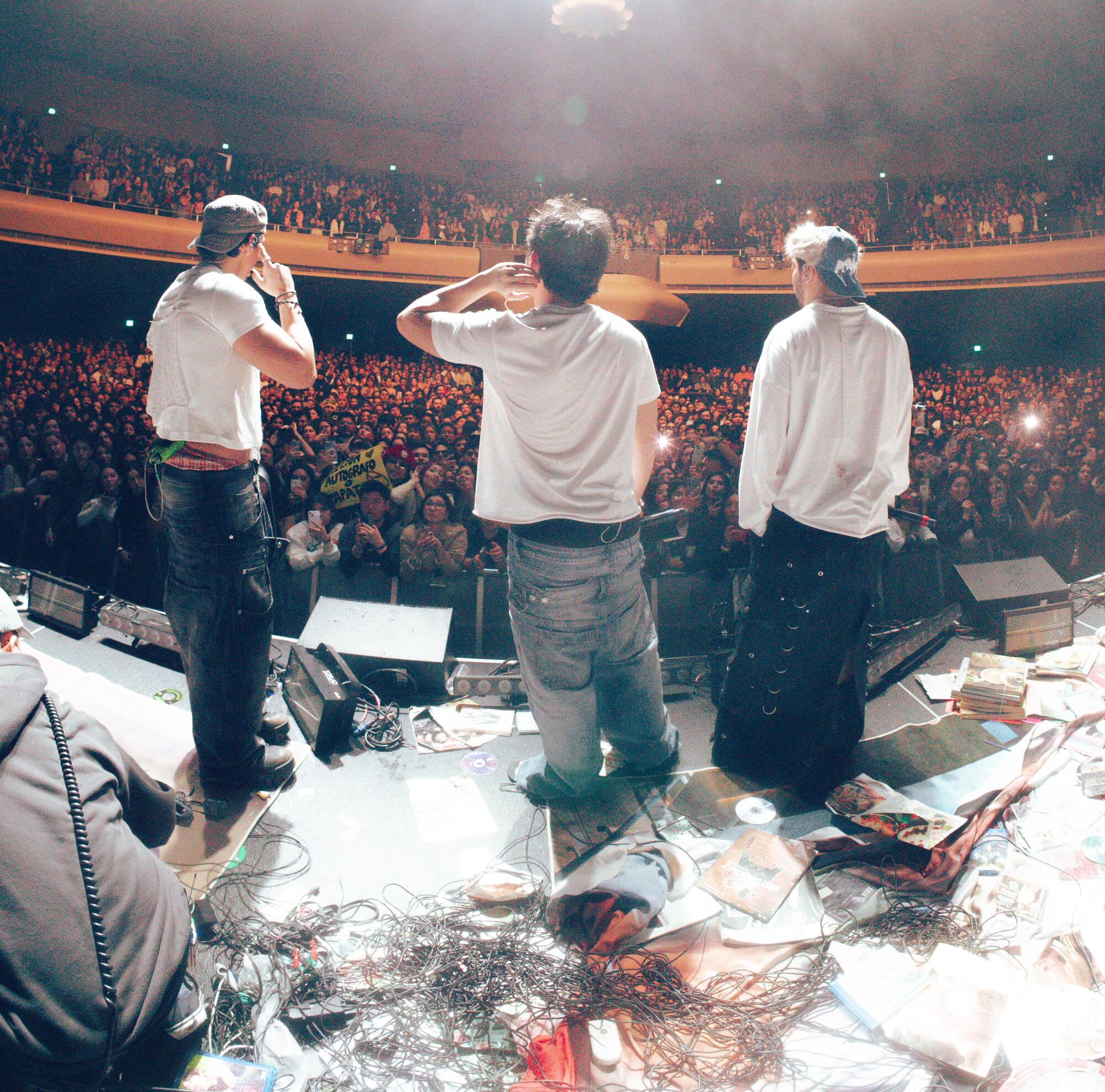The last 12 months have been full of firsts for the De la Rosa brothers, better known as the musical trio Latin Mafia.
In April, the Mexico City natives performed for the first time in the United States at the Coachella Valley Music and Arts Festival in Indio. In July, the band signed with Puerto Rican reggaeton label Rimas Entertainment, making Bad Bunny its label mate. In October, the trio released its debut full-length record, “Todos Los Días Todo El Día.” Now, the brothers are on their inaugural U.S. tour., a 17-stop trek that kicked off Jan. 22 with a sold-out show at the Hollywood Palladium.
Newsletter
The Latinx experience chronicled
Get the Latinx Files newsletter for stories that capture the multitudes within our communities.
You may occasionally receive promotional content from the Los Angeles Times.
Before taking the stage at the famed L.A. venue, twin singers Milton and Emilio, who are 22, and producer Mike de la Rosa, 24, found themselves in line at Erewhon’s hot bar. As they indulged in the high-end grocer’s buffalo cauliflower and perusing L.A.’s boutique shops, they were not nervous at all. Confidence is something that has marked their rise to fame.
“We all had a similar mindset. We had a feeling music was going to work out for us,” said Mike de la Rosa. “But it still does feel like a dream come true, because you never really know.”

Latin Mafia‘s Mike de la Rosa, Emilio de la Rosa and Milton de la Rosa.
(directony)
The siblings have always bonded over making music, but it wasn’t until the COVID-19 pandemic that they decided to take it more seriously. Like many of their adolescent counterparts, they turned to TikTok as a creative outlet. Their earliest videos include behind-the-scenes of their genre-blending process and remixes of popular Latin songs with new lyrics. Their consistent posting resulted in a small following. In turn, their early singles, like the dreamy Latin pop track “Julieta” and the electronic “No digas nada,” had a ready-made audience.
It wasn’t until “Julietota,” a reggaeton track that builds on the last 30 seconds of “Julieta, ” that the Latin Mafia’s videos began to surpass a million views. With the perreo-driven song, the band members cracked the algorithm. Before long, they were collaborating with fellow Mexican pop singer Humbe on “Patadas de Ahogado.” The breakout 2023 sentimental ballad has been streamed 200 million times on Spotify, making it Latin Mafia’s most popular song to date.
With these back-to-back hit releases, the trio began to sell out arenas in Mexico and perform at music festivals in the country — all without a full-length project to its name or record label backup. The brothers’ sound, which dabbles in genres like pop, R&B and Latin trap, helped set them apart from other música Mexicana acts.

“I don’t think we are always making something different. We live in a time where everything has already been invented,” Milton de la Rosa said of Latin Mafia’s influences. “We’re just trying to do something we love in our own way.”
They continued to follow these sonic instincts with the making of “Todos Los Días Todo El Día.” As a turning point for the rising trio, they elevate their sound by turning their early bedroom pop-esque style into a more refined, experimental reflection of themselves.
“I always say when you just listen to music, sometimes it will only be sad,” said Emilio. “But you can feel it when you can say something, when you can understand it, when you can give a part of yourself to the ones that are listening to you — that’s when it becomes real.”
Mike credits this ability to a series of “happy accidents.” Drawing from their collective experiences with anxiety, depression and heartbreak, they say they prioritize raw emotion and trusting their gut feelings in their creative process.
During the making of the album, the twins say they would run circles around the studio as Mike played different drums. Chasing each other from one end to the next and leaning into the youthful energy of their early 20s, they recall coming to a halt whenever Mike’s drums resonated with them. Huddling around him, the brothers would begin brainstorming what sounds could blend together or what feeling the track was stirring.
“We want to have fun while making music. There’s no certain way to make music. We just play around, and if it sounds good, we chase it. There are moments in the studio where all three of us are doing something wrong,” said Milton. “For some reason, it sometimes ends up sounding good.”

Latin Mafia — Mike de la Rosa, Emilio de la Rosa and Milton de la Rosa.
(directony)
The album’s opening track, “Siento que merezco más,” sets the tone. It introduces the brothers’ ability to shift gears within a singular track, taking listeners to Mexico City with a distorted sample of the city’s street organs, infusing moments of a dejected ballad with an angsty punk feeling and invoking flashes of an electronic garage production. From the piano-backed trap beat on “Nunca he sido honesto” to the sudden rumbling synth on “Vivo si me exiges” and the peaceful harmonies on “Me estoy cayendo,” the record succeeds in following Latin Mafia’s unpredictable formula of stark switch-ups and evocative lyricism.
Critics immediately embraced “Todos Los Días Todo El Día,” which appeared on many best of Latin music in 2024 lists.
For the De la Rosa brothers, “Todos Los Días Todo El Día,” is a tribute to the most important people in their lives — their family and friends. Its final track, “Tengo mucho ruido,” ends with the voice of their elderly grandma. As the echoing synth wanes, she blesses them and wishes them safety.
“We wanted to be able to listen to her voice over and over again,” said Milton. “Music is made for memories. It’s made to freeze moments in time and bring color to these memories. My biggest fear is forgetting, but I know our music will always be here to remind me over and over of all the people I love.”
Now, both their grandma and her “muchachitos tramposos” can find peace in the album’s final notes.
